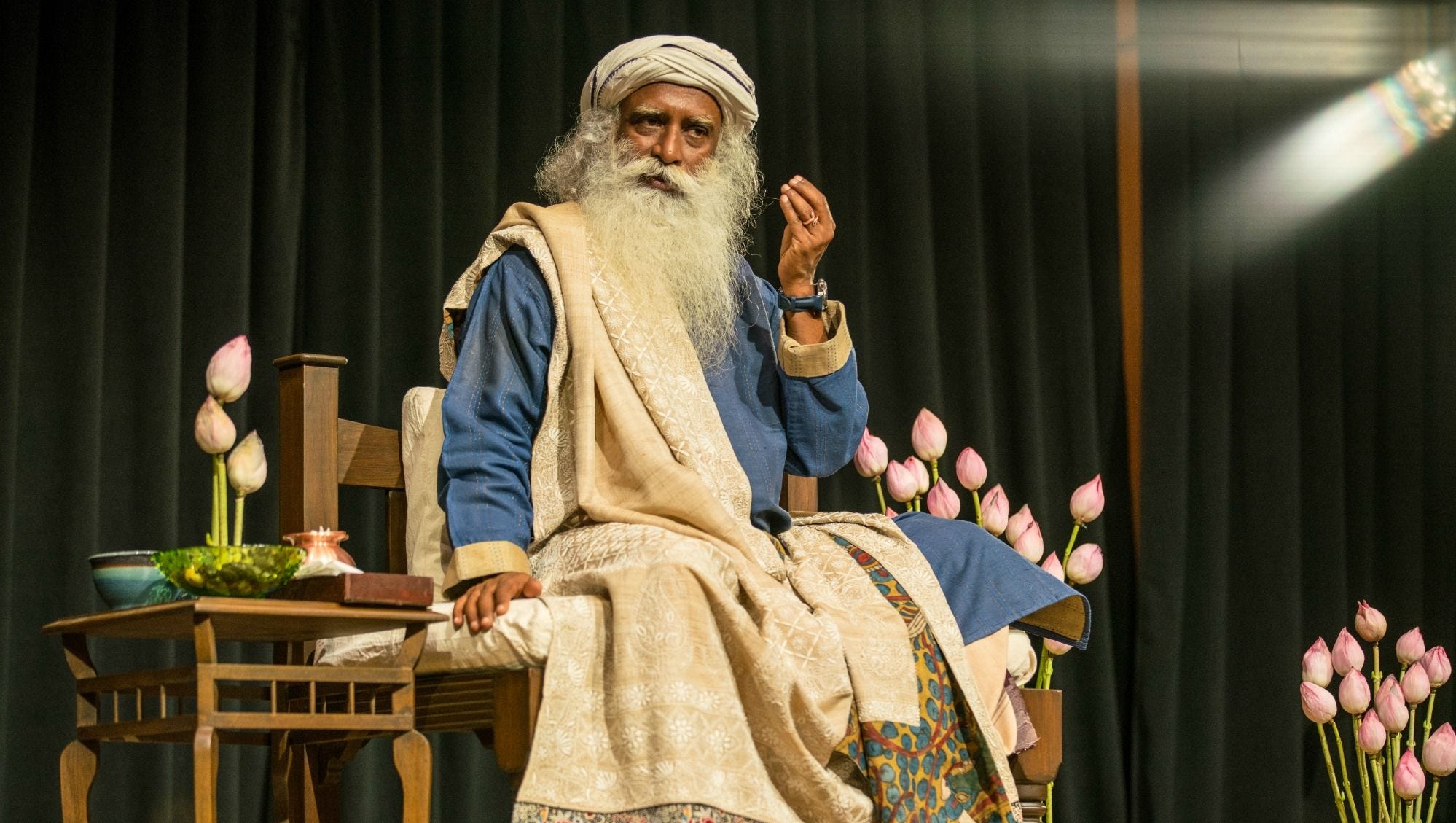Sadhguru Jaggi Vasudev : A mystic
“A human being, the more intelligent he becomes, the more confused he gets – every step is a confusion. Only an idiot is dead sure. The sign of intelligence is that you are constantly wondering. Idiots are always dead sure about every damn thing they are doing in their life.” – Sadhguru
Jaggi Vasudev, popularly known as Sadhguru has perfected a dish that is a mix of religious politics and blind faith and yet tastes surprisingly like a blend of rationality and ecumenism. He is the founder of the non-religious, public service organisation, Isha Foundation, comforts corporate heads and the common man alike.
Sadhguru Jaggi Vasudev is a multi-facet personality; he is a famous philanthropist, spiritual leader, and author. He works indefatigably for creating harmony between body mind and spirit. Through his Isha Foundation, he spreads knowledge on yoga and well-being of folks.

What makes the latest generation of people around the world connect with Sadhguru? Is it his flamboyant nature? Is it his philanthropic activities? Is it live speeches with cross section of people? In this article we look at the combination of different programmes, activities and his life lessons that have made him a popular personality that this generation reverends.

He is yoga guru and spiritual leader who adorns blue jeans, t-shirt and rides a motorcycle. Countering this, he says, “A motorcycle is just a means of transport and sometimes fun. At one time I crisscrossed India on my motorcycle. I literally lived on a motorcycle for a few years. I really did not grow up in a spiritual atmosphere, I grew up reading Camus, Kafka, Dostoyevsky, listening to the Beatles. I did not have any spiritual stuff in me. For me spirituality is what happened within me.”
Sadhguru : An Activist for Social Change
Apart from yoga programmes, the Isha Foundation is the major establishment, through which he executes various social and community development activities. The primary objective of Jaggi Vasudev is to healthcare improvement of the rural poor in 54000 villages across Tamil Nadu.
He also runs a project to plant 114 million trees to increase forest in overall Tamil Nadu. Apart from the well-being of people, he was awarded the Indira Gandhi Paryavaran Puraskar by the Government of India in 2010.

Jaggi Vasudev is a multi-facet who widely runs Isha foundation for the well-being of people and other social activities. Since his childhood, he has a great love for wild animals and nature. Therefore, he established the Project Green Hands to planting trees across the Tamil Nadu.

Explaining about Isha Foundation, Sadhguru said: “The Isha Yoga Center is a commune — in a way, it is a communist arrangement. Nobody is asking how much you have, your religion, caste, where you come from, who your father is. We will treat you like we treat everyone else. If you rise and show some special qualities, we will honour that as well. Communism means everyone is sharing and living together. For instance, you are willing to give away your phone to someone who does not have one, or at least share it with your neighbour because, after all, you are a party member. In the Yoga Center we do such things effortlessly. This is absolute left.”

Isha Foundation’s rural rejuvenation programmes: Over 70 per cent of Indian population lives in villages. If all of them move to cities you do not know what kind of chaos it will create. It is very important that the city moves into the village. At the same time it is important we get people out of agricultural activity and get them into other skills, because 70 per cent of the people producing food in this country means if 10 people have to eat 7 people are cooking, which is an inefficient way of managing anything. In China, probably 10-13 per cent are in agriculture, in United States it is only about 4 per cent. Even if you don’t go that far at least you must bring it down to 25 to 30 per cent to make this an efficient process. If that has to happen we have to go down to rural India and develop skills and they need not migrate here.
Corporate World relates to Sadhguru
Stress in Corporate India: The problem is, you ask the chaprasi (peon) on the street, he is stressed about his job . You ask the housewife with two children – she is stressed with one husband and two children. You ask the prime minister, well, he looks stressed. The stress is about the way you are, you have not understood how to use this fantastic mechanisms – human body and mind. You have not read the users’ manual.
Aping the West: It is not material versus spiritual, there is no such thing. According to Living Earth statistics, if we have to provide the lifestyle that an average American is enjoying right now for the 7.25 billion people we have on this planet we will need four and half planets. But we only have half a planet. Is it realistic for the whole world to go that way? The world’s idea of ideal life has become the American life, isn’t it? It is a sure recipe for disaster, there is no question about it. The better solution would be… at least if we strive for the next 50 years we can bring down the population to 50 per cent of what it is right now. It will give a little more freedom to the earth to recoup itself for whatever rubbish we do. If we don’t do that ourselves consciously the planet will do it to us in cruel ways.
Vision for India: If you do that one thing, the Indian population is so effervescent it will make India happen. Aren’t there 540 business or industries in this country which can take up education, nourishment of one constituency each not as service, but as an investment? If you invest in this population you will get quality manpower in the next 12 to 15 years time, why don’t you invest long term? I don’t want any philanthropy, you invest long term, produce the right kind of people, only then you can run the business, otherwise you are going to the Philippines…
About Philanthropy: Philanthropy is not going to make the nation great. Because people who receive may feel grateful but they won’t feel great. But if they become worthy of investment they will feel great. This is what we need to do to the people – bring back pride in who they are.
Short Bio of Sadhguru
He was born on 3rd Sep 1957 in Mysore. Sadhguru’s father was an ophthalmologist in Indian Railways. Due to his father’s job, they frequently move from place to place. In his childhood, he developed a love for nature and adventure. He frequently ran to the jungle and observed wild animals and catching snakes.

When he was 11 years old, he built a career in yoga. A well-known yoga teacher named Malladihalli Sri Raghavendra Swamiji taught him series of Asana and other forms of yoga. After completion of his schooling, he started his graduation with a B.A in English Literature. While in college, he was showing interest in motorcycles and rode a lot with his friends.

After completing his college study, Sadhguru started a career as a businessman. The all-round skilled person opened his business in different filed, including construction building, brickworks, and a poultry farm.
How Sadhguru become a Spiritual Master ?
His life changed completely when he suddenly realized he had to re-evaluate his life and responsibilities. Jaggi Vasudev left his business to one of his friends and started his extensive journey to gain mystical experience.
In 1983, he ran Yoga programs in Mysore; in his first-class, there were only seven participants. Over the year, he conducted yoga courses in Karnataka and Hyderabad. He denied payment for the classes and managed expenses through his poultry farm.
In 1992, he founded Isha Foundation to offer yoga classes and helping people to develop Inner Zen. Now the foundation has upsurge in popularity and provides yoga programs in India as well as other countries.
Life Lessons from Sadhguru
1. Give your conclusions
2. Don’t talk about anything that is not in your experience
3. Don’t be positive or negative – just see it the way it is
4. Look at what binds you
5. Change yourself – don’t try to change anyone else
6. Get rid of your ‘but’
7. You have to do it the way it works
8. Act consciously, not compulsively
9. Don’t take your mind too seriously
10. Find out for yourself
@religionworldin
[video_ads]
[video_ads2]









